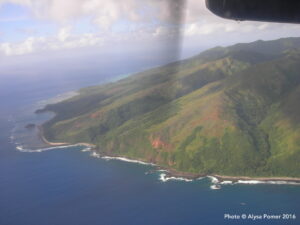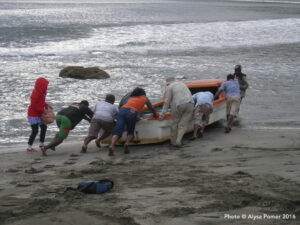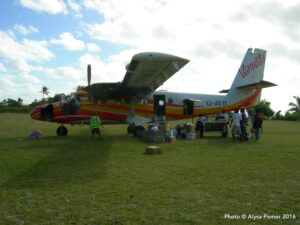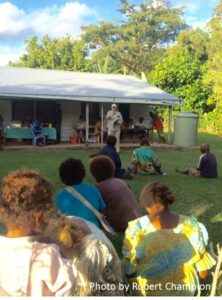Engaged Anthropology Grant: Ralph Garruto

Ralph Garruto is a Research Professor of Biomedical Anthropology at Binghamton University. In 2011 he received a Post-Ph.D. Research Grant to aid research on “Longitudinal Studies of Health Transition and Culture Change in Vanuatu”. In 2015 Dr. Garruto received an Engaged Anthropology Grant to aid engaged activities on “Using Anthropology to Build Research Capacity and Inform Public Health Policy in the Republic of Vanuatu”.
Three major thematic research areas within the Binghamton University Health Transitions Project are 1) adult health and chronic disease risk, 2) behavior and lifestyle change, and 3) child health and nutritional status. Thus far, field research studies relating to these thematic areas have been conducted on the islands of Ambae, Aneityum, Efate, Futuna, and Nguna inVanuatu. A fourth research area, post-disaster stress, was added in 2015 to assess to impact of Cyclone Pam on the people of Vanuatu. The latter study includes the islands of Tanna and Erromango as well as Efateand Aneityum (Wenner-Gren Foundation for Anthropological Research, P.I. Kelsey Dancause).

The Binghamton University Vanuatu Health Transition project has resulted in a number of publications in scholarly journals, including the American Journal of Human Biology, Obesity, the Asia Pacific Journal of Clinical Nutrition, and Public Health Nutrition. Results from the project have also been presented at major national and international scientific meetings, including five scientific presentations at the “Asia-Pacific Region Joint Conference on Modernization and Health”,Hilo,Hawaii, August 19-20, 2016. The latter conference was co-sponsored by the Japan Physiological Anthropology Society, the Human Biology Association, and the University of Hawaii at Hilo. The P.I. gave a 30 minute keynote presentation on Health Transition in the Pacific.
The Wenner-Gren Engagement Grant (Gr. EAG-84) allowed the P.I. (Ralph M. Garruto) to produce a signed memorandum of agreement (MOA) between the Director General, Vanuatu Ministry of Health, Republic of Vanuatu, and the State University of New York at Binghamton. The MOA is a five-year renewable collaboration effort to foster engagement and advancement in research, education, training and cultural understanding. The MOA specifically calls for:
- Conducting long-term research projects in the areas of mutual interest to the Vanuatu Ministry of Health and Binghamton University.
- Providing training for both Vanuatu Ministry of Health personnel, and students in the MS and BS/MS Program in Biomedical Anthropology at Binghamton University.
- Securing funding for anthropological and public health research in Vanuatu.

The original signed agreement by the President of Binghamton University was handed to the Director General of the Ministry of Health, George Taleo. The PI also gave him an overview of our research results on the Binghamton University Health Transitions Project in part sponsored by Wenner-Gren (Parent grant Gr. 8301 and Engagement grant Gr. EAG-84). In addition, the P.I. was able to meet with the Honorable Ralph Reganvanu, Minister of Lands and a member of Parliament, and himself an anthropologist, and update him on our findings and explain the details of the MOA and how it would provide not only for continued research on the long-term health behaviors of the people of
Vanuatu as a result of modernization and change, but also on how we would train members of the Ministry of Health to carry out future research, implement surveys, perform anthropometric measurements, and evaluate child growth, development, and nutrition. We also explained that graduate students in Anthropology could intern with the Ministry of Health to assist them specifically with their own ongoing projects that they deemed vital for the health of the nation.

The last component we were able to implement as a result of the Wenner-Gren Engagement Grant was to return to six villages on three different islands (Efate, Nguna, and Aneityum) and give a bound copy of our research results to the communities and local dispensaries. Additionally, the P.I. gave an oral presentation of our findings to the Council of Chiefs and Community Members of Aneityum Island. The island, further south in the archipelago, has been a part of our research survey on health transitions since 2007 and the oral presentation to the community detailed our results in lay language and the recommendations we thought useful to stem the tide of hypertension, overweight and obesity, and poor nutritional practices that have ensued over the past 10 years.
Overall, the P.I. viewed our engagement with the Ministry of Health, with government officials and with the local communities as highly successful and one that would reflect well on both Wenner-Gren as the engagement funding institution, Binghamton University as the co-signer of the MOA, and on the researchers and students, past and present, from three separate institutions: University of Montreal, Temple University, and Binghamton University.